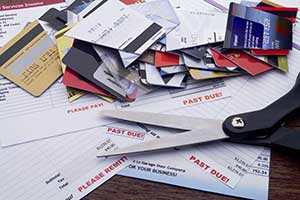
The bad guys are after your credit cards, and you can’t be too careful in protecting them. Credit card fraud costs billions of dollars each year in the United States, and everyone winds up paying through increased finance charges and annual fees.
In Ohio, credit card fraud is defined as the unauthorized use of another person’s credit or debit cards or their information. This includes making online purchases, making or possessing fake card readers, and making purchases with stolen devices.
Credit card fraud is common, but there are ways to prevent becoming a victim and winding up with additional debt as a result. The skilled and seasoned Ohio debt relief attorneys at Fesenmyer Cousino Weinzimmer offer some tips to prevent credit card fraud from happening to you.
Common Types of Credit Card Fraud
The first thing you can do to prevent becoming a victim is to become aware of the risk and be on the lookout for the most common types of credit card-related fraud. These include:
- Application fraud — This involves using your identity to apply for credit or a new credit card. The thief will first obtain details about your card or steal your supporting documents and then use them to substantiate a fraudulent card application.
- Lost and stolen card fraud — Criminals find or steal your card and make charges on your account.
- Card-not-present fraud — Thieves find out your account number and expiration date, and use it through mail, phone or internet without your physical card.
- Counterfeit cards — This fraud usually involves skimming through a credit card skimmer — a device that can be attached to a card reader that steals your information when you swipe your card. The data is then transferred onto a fake magnetic stripe card.
- Card ID theft — This occurs when a criminal has managed to obtain your information and uses it to open or take over a card account in your name.
- Account takeover — The criminal calls your credit card company and requests a change of address to one controlled by the criminal and asks that a replacement card to be sent to the new fake address.
Preventing Credit Card Fraud
You can help prevent fraud by stopping criminals from getting access to your cards and personal information. To help minimize your risk of fraud:
- Do not give your credit or debit card account number, expiration date, or code to anyone over the phone unless you know the company with which you’re dealing.
- Sign your new card immediately, so criminals can’t sign your card in their handwriting.
- Get your card back immediately after you make a credit card transaction.
- Never leave your wallet or purse unattended.
- Draw a line through blank spaces on your receipt so no one can fill in an extra amount. Do not sign blank charge receipts, and make sure the exact amount is entered on the receipt before you sign.
- Save your receipts and check them with your bill to make sure there are no unauthorized charges. Report any charges you do not recognize to your credit card company immediately.
- Look for credit card skimmers, especially at ATM machines or a gas station. Look for anything odd fitted over the device that looks newer or loose, and report it to the business.
- Use chip cards instead of swiping whenever possible.
- Make sure that it is your card that is returned to you after using it. If your card is switched, the person who gets it may not be honest.
- Memorize your PIN (Personal Identification Number). Do not carry your PIN in your wallet or write it on your card.
What to Do If You’re a Victim
Always look out for clues to tell you that your cards have been compromised, such as:
- Your credit report has inquiries or information on accounts you didn’t open.
- Your billing statements have charges you didn’t make.
- You get bills from unknown sources or calls from creditors for unexplained charges.
If you think you are the victim of a lost or stolen credit card, make sure to do the following:
- Alert your credit card company first — provide your credit card number and your login information. Note the date, time and person to whom you reported the problem, so you will not be responsible for charges you didn’t authorize. Your maximum liability under federal law is $50 per card.
- Contact the Ohio Attorney General Consumer Protection Division, 1-800-282-0515.
- Contact the credit bureaus. Report the fraud to one of the credit bureaus — Experian, Equifax or TransUnion — so it can put a credit fraud alert on your account and share that information with the other bureaus. Experian: 1-888-397-3742; Equifax: 1-800-766-0008; TransUnion: 1-877-322-8228.
- File a police report, which becomes documentation to send to your credit card issuer.
- Contact an attorney — Ohio’s consumer and criminal laws can be complicated, so it can help to contact an experienced attorney if you have questions about your liability or specific situation.
Contact Us for Help With Financial Troubles
If you are dealing with credit card debt, we can help. The experienced and compassionate Ohio debt relief attorneys at Fesenmyer Cousino Weinzimmer offer a free consultation to discuss your financial affairs and options to resolve your debt.
Delaying can only worsen the situation, so call the Ohio bankruptcy attorneys at Fesenmyer Cousino Weinzimmer today. Call one of our conveniently located office branches at 614-228-4435 (Columbus), 937-222-7472 (Dayton), or 877-654-5297 (Cincinnati) or email for your free consultation so we can determine what solutions will work best for you.


